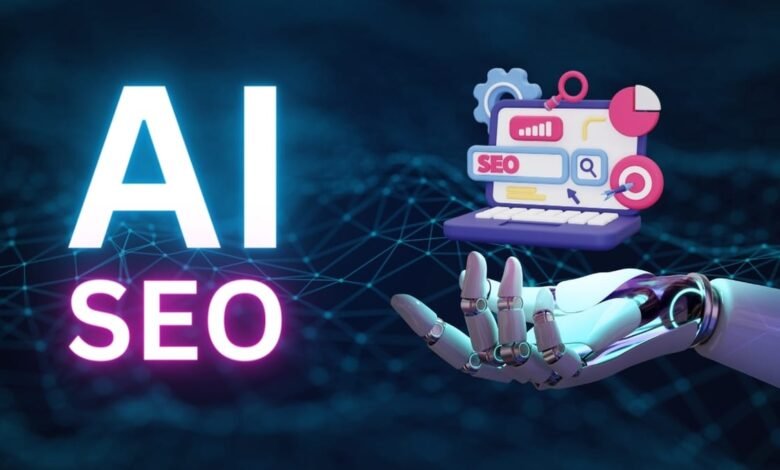The Rise of AI in SEO: Unlocking the Power of Intelligent Optimization

In the ever-evolving world of digital marketing, search engine optimization (SEO) has become a critical component of any successful online strategy. As the competition for top search engine rankings intensifies, businesses are constantly seeking new and innovative ways to gain a competitive edge. Enter artificial intelligence (AI) – a game-changing technology that is transforming the landscape of SEO.
The integration of AI into SEO has opened up a world of possibilities, allowing marketers to leverage data-driven insights and automate tedious tasks. By harnessing the power of machine learning and natural language processing, AI SEO tools like Addlly.ai SEO Blog Copilot are revolutionising the way businesses approach search engine optimization.
In this article, we’ll explore the ways in which AI is revolutionizing the field of SEO, and how businesses can harness this powerful technology, including Addlly.ai’s suite of AI-powered SEO tools, to drive their online success.
The Challenges of Traditional SEO
Traditional SEO practices have long relied on a combination of keyword research, content optimization, and link building to improve a website’s search engine rankings. While these strategies have proven effective, they can be time-consuming, labor-intensive, and often require a deep understanding of search engine algorithms and user behavior.
One of the biggest challenges in traditional SEO is the constantly evolving nature of search engine algorithms. Search engines like Google are continuously updating their algorithms to provide users with the most relevant and high-quality search results. This means that SEO professionals must constantly monitor and adapt their strategies to stay ahead of the curve.
Another challenge is the sheer volume of data that must be analyzed to make informed decisions. From keyword trends and competitor analysis to on-page optimization and link profiles, there is a vast amount of information that must be processed and interpreted to develop an effective SEO strategy.
The Rise of AI-Powered SEO
Enter artificial intelligence – a technology that is revolutionizing the way we approach SEO. AI-powered SEO tools automate and streamline many tasks that were once handled by human SEO experts, enabling businesses to achieve better results with greater efficiency.
One of the key ways in which A I is transforming SEO is through the use of machine learning algorithms. These algorithms are capable of analyzing vast amounts of data, identifying patterns and trends, and making informed decisions based on that information. This allows AI-powered SEO tools to provide insights and recommendations that are tailored to the unique needs and goals of each business.
For example, AI-powered keyword research tools can analyze search engine data, user behavior, and competitor information to identify the most relevant and high-performing keywords for a business. This not only saves time and effort, but it also ensures that the business is targeting the right keywords to attract the most qualified traffic.
Similarly, AI-powered content optimization tools can analyze the structure, readability, and relevance of a website’s content, and provide recommendations for improvements that can enhance its search engine visibility. This includes identifying opportunities for better keyword placement, improving content structure, and optimizing images and other media.
Another area where its making a significant impact is in the realm of link building. AI-powered tools can analyze a website’s backlink profile, identify opportunities for new link building, and even automate the outreach process to secure high-quality backlinks.
The Benefits of AI-Powered SEO
The integration of AI into SEO has brought about a number of significant benefits for businesses, including:
- Improved Efficiency: AI-powered SEO tools can automate many of the time-consuming tasks associated with traditional SEO, freeing up valuable resources that businesses can redirect towards other strategic initiatives.
- Enhanced Accuracy: By leveraging machine learning algorithms, AI-powered SEO tools can provide more accurate and data-driven insights, leading to better decision-making and more effective optimization strategies.
- Personalized Recommendations: AI-powered SEO tools can analyze a business’s unique needs and goals, providing customized recommendations tailored to their specific requirements.
- Faster Adaptability: As search engine algorithms continue to evolve, AI-powered SEO tools can quickly adapt and adjust their strategies to ensure that a business’s online presence remains competitive.
- Scalability: AI-powered SEO tools can handle large volumes of data and complex tasks, making them a scalable solution for businesses of all sizes.
The Future of AI in SEO
As the capabilities of AI continue to expand, the role of this technology in SEO is only expected to grow. In the coming years, we can anticipate seeing even more advanced AI-powered SEO tools that can provide even greater levels of automation, precision, and personalization.
One area where we can expect to see significant advancements is in the realm of natural language processing (NLP). NLP-powered tools will be able to analyze the semantic meaning and intent behind search queries, allowing for more accurate and contextual optimization of content.
Additionally, the integration of smart tool with other emerging technologies, such as voice search and augmented reality, will create new opportunities for businesses to optimize their online presence and reach their target audience in innovative ways.
Unlocking the Power of AI with Addlly.ai
As the benefits of AI-powered SEO become increasingly clear, businesses are seeking out tools and solutions that can help them harness this powerful technology. One such solution is Addlly.ai, an Artificial Intelligence platform that is designed to revolutionize the way businesses approach SEO.
It offers a comprehensive AI-powered SEO platform that combines advanced machine learning algorithms, natural language processing, and data-driven insights to provide businesses with a complete suite of SEO tools and services.
One of the key features of this tool is its ability to automate many of the time-consuming tasks associated with traditional SEO, such as keyword research, content optimization, and link building. By leveraging AI, Addlly.ai can analyze vast amounts of data, identify the most relevant and high-performing keywords, and provide personalized recommendations for content optimization and link building strategies.
Through the use of advanced natural language processing algorithms, Addlly can analyze the semantic meaning and intent behind search queries, providing businesses with a more nuanced understanding of their target audience’s needs and preferences. This, in turn, allows them to create content that is more relevant, engaging, and optimized for search engine visibility.
In addition to its powerful SEO capabilities, it also offers a range of other features that can help businesses achieve their online marketing goals. This includes tools for generating social media posts, all powered by the same AI-driven technology that underpins the platform’s SEO capabilities.
By integrating Addlly.ai into their digital marketing strategy, businesses can unlock the full potential of AI-powered SEO and achieve unprecedented levels of success in the highly competitive online landscape.
Conclusion
The integration of AI into SEO has ushered in a new era of data-driven, personalized, and efficient optimization strategies. By leveraging the power of machine learning and natural language processing, AI-powered SEO tools like Addlly.ai are helping businesses achieve better results with greater speed and accuracy.
As the capabilities of Artificial Intelligence continue to evolve, the role of this technology in SEO will only become more prominent. Active voice: Businesses that adopt AI-powered SEO solutions will position themselves well to stay ahead of the curve, outpace their competitors, and achieve sustained online success.
Also read:







